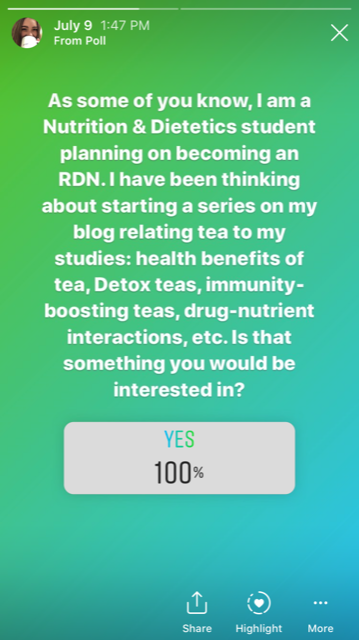Health Benefits of Tea
Recently, I have seen teas and tea companies make a lot of health claims, such as boosting your immunity or helping with weight loss. As a Nutrition and Dietetics student and “RD2Be,” I have been interested in researching the validity of these claims. I also think it is extremely important to educate the public about these claims, so I decided to start a new series here on my blog. Before we get into the truth behind specific health claims on tea, I wanted to make an article about the general health benefits of tea.
Nutrients in Tea
According to the Academy of Nutrition and Dietetics (AND), both teas and tisanes contain very small amounts of potassium, phosphorus, magnesium, sodium, copper, and zinc. The actual amount of each mineral depends on the age and growing conditions of the plant. The AND doesn’t mention anything about the processing of tea, but I would assume that the amount of minerals also varies based on how the leaves are processed. Tea may also provide fluoride if the water you use to make the tea has fluoride in it.
Additionally, all teas from the Camellia sinensis plant (black, green, white, oolong, and pu’erh) contain caffeine. An 8-ounce cup of black tea has approximately 48 milligrams of caffeine. The same size cup of green tea has about 29 milligrams of caffeine, while 8-ounces of oolong tea contains around 38 milligrams of caffeine. Note that total daily caffeine intake should not exceed 400 milligrams. As expected, decaffeinated teas contain very little caffeine. Most herbal teas or tisanes are caffeine-free. The only exception I know of is yerba mate, along with any tea-tisane blends.
Antioxidants in Tea
Tea, including herbal tisanes, contains natural substances called polyphenols, which are antioxidants. You’ve probably heard all about antioxidants, but what are they? Antioxidants are compounds that protect cells from the damage caused by oxidation, which can cause cancer, heart disease, type 2 diabetes, arthritis, cataracts, and Alzheimer’s and Parkinson’s diseases.
Can tea help with all of these chronic diseases? The AND lists heart health, diabetes, and cancer, plus weight management, as areas where the benefits of tea are being researched. I am planning on looking into how tea can help all of these chronic diseases in future blog posts.
It is important to note that research suggests green tea has more antioxidants compared to other types of tea. However, processing destroys some of the polyphenols in tea. The AND specifically mentions that because of this, tea powders, decaffeinated teas, and bottled tea drinks may not offer the same health benefits. As you may know, matcha is a green tea powder that claims to be very high in antioxidants, so the mention of tea powders led me to some further research. A 2017 study did in fact find that matcha had less antioxidant activity than other kinds of loose-leaf and bagged green tea. However, the differences were so small they were considered insignificant. Additionally, there was no clear ranking of the different forms of green tea, with one brand of loose-leaf tea having the most antioxidants, another falling below the bagged teas, and the final loose-leaf tea brand coming in last place behind the matchas. What does this all mean? Basically, matcha is high in antioxidants, but maybe not higher than other forms of green tea.
Quality of Tea
I recently took part in the Sipping Streams 5 Days of Tea Transformational Journey, where I learned so much about the health benefits of tea. I will be incorporating much of this knowledge into future posts, but there is one main takeaway that I needed to include in this article: The quality of your tea greatly effects the health benefits you can get from drinking it. Lower quality tea, such as those you will find at the grocery store, don’t have as many essential oils as high-quality, and especially loose-leaf, tea. Without the essential oils, you have less nutrients and antioxidants, and therefore less health benefits. Additionally, tea sold at grocery stores is often stale from processing, shipping, and sitting on the shelf. As with all foods, stale tea looses its nutrients, and therefore its health benefits. So in order to get the most health benefits of your tea, make sure you are drinking high-quality tea, and go for loose-leaf if possible.
In conclusion, the health benefits of tea are vast, and still being researched. In general, tea offers some minerals, as well as antioxidants that may help prevent or fight off certain chronic diseases. Be on the lookout for future blog posts about the relationship between tea and these chronic diseases. And leave a comment below if there are any specific chronic diseases or teas you want me to look into.
References
Farooq S, Sehgal A. Antioxidant Activity of Different Forms of Green Tea: Loose Leaf, Bagged and Matcha. Curr Res Nutr Food Sci 2018;6(1). doi : http://dx.doi.org/10.12944/CRNFSJ.6.1.04
Gordon, Barbara. “The Health Benefits of Tea.” EatRight, Academy of Nutrition and Dietetics, 21 Jan. 2020, www.eatright.org/health/wellness/preventing-illness/the-health-benefits-of-tea.
Notes:
Some links are affiliate links. I make a small commission off anything bought via these links.
I am not yet a Registered Dietitian and am therefore not certified to give nutrition counseling. Please consult your doctor or other healthcare provider before following the advice in this article.
—
Like this article? Read more like it here:



